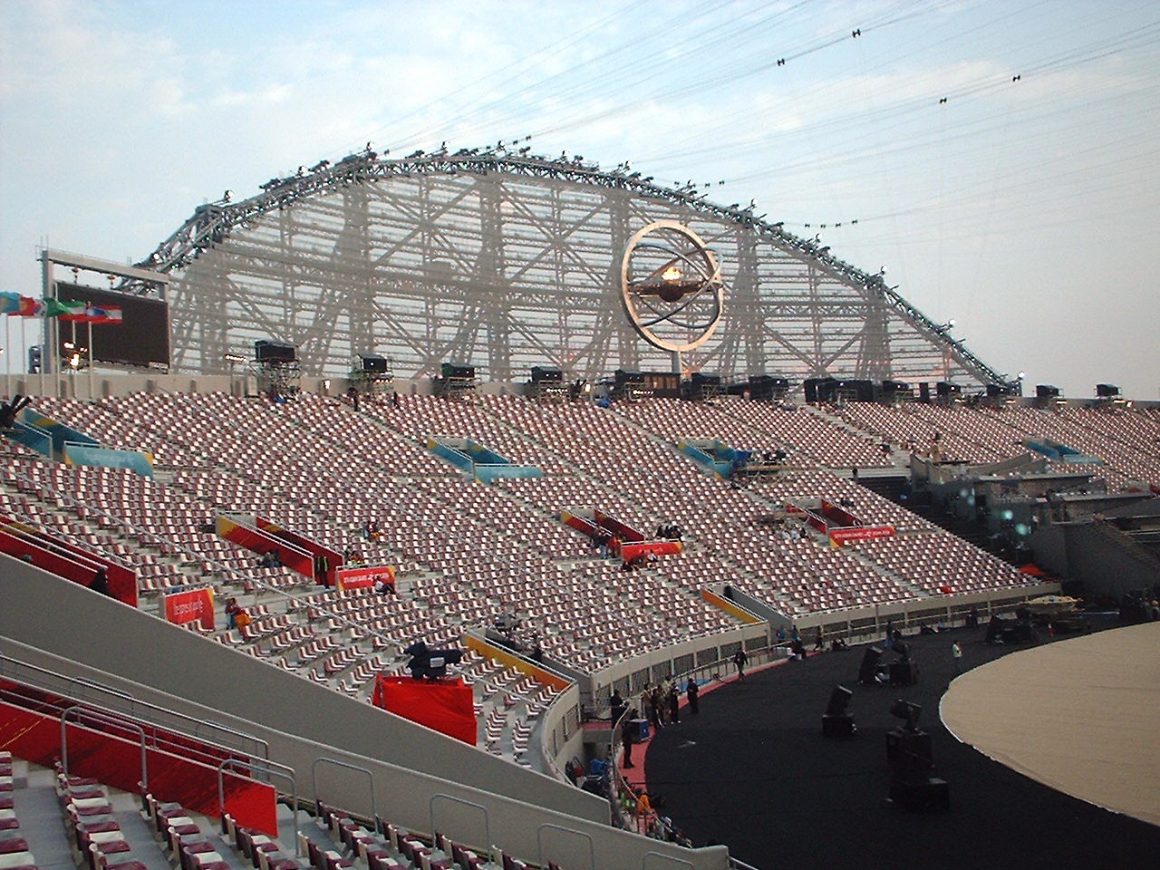
World Athletics Championships in Doha presented more problems than heat
By Tori Taylor, October 8 2019 —
The 2019 World Athletic Championships were held in Doha, Qatar from Sept. 26–Oct. 6. When Qatar bid to host the championships back in 2011, they talked about having no empty seats and ensuring a fantastic, athlete-supportive atmosphere. This was not how it played out. As the days passed, issue upon issue piled up. From empty stands to dangerous heat temperatures to controversial human rights situations, Doha will not be remembered as the glorious event that was promised.
The Khalifa International Stadium had dimmed lights, blaring music and distracting spotlights roaming the arena from athlete to athlete as finalists were presented. It would seem that the organizers of this year’s World Athletics Championships were doing all they could to hide the horribly vacant seats lining the stadium. The 40,000 seats were reduced to 21,000 by covering huge areas with fabric. Tickets had been given away for free to the public and organizers gave thousands of migrant workers from India and Africa free tickets. But even with capacity dropped to half, the stands still rang almost silent. This was the most energy-lacking event in the history of the World Athletic Championships.
The intense heat of Doha presented athletes with unbearable temperatures and wreaked havoc. Of the 68 female marathon runners that started their event, only 40 were able to finish. The women’s marathon was held at midnight to avid the peak day-time temperatures but that did not stave off the disaster that ensued. Kenya’s Ruth Chepngetich crossed the finish line in two hours, 32 minutes and 43 seconds. This is the worst ever World Championships gold-medal time and over 15 minutes slower than her personal best. She collapsed in an interview with the media after her win. Several of the 28 athletes who were unable to finish their event did not even make it to the halfway point. The weather conditions were detrimental right from the starting line and had already started to seriously affect the runners. Athletes were wearing ice scarves and constantly pouring cold water over their heads. The women who were unable to finish the marathon were not the only ones furious — those who completed the race were equally as upset at the dangerous conditions that they were expected to compete in.
“The humidity kills you,” said Volha Mazuronak, of Belarus, who finished fifth, in an interview with The Gaurdian. “There is nothing to breathe. I thought I wouldn’t finish.”
“It’s disrespect towards the athletes,” Malzuronak continued. “A bunch of high-ranked officials gathered and decided that it would take place here but they are sitting in the cool [air-conditioned stadium].”
“It was really scary and intimidating and daunting. I’m just really grateful to have finished standing up,” said Canada’s own Lyndsay Tessier — who finished in ninth place. “You see somebody down on the course and it’s just extremely grounding and scary. That could be you in the next kilometre, the next 500 metres.”
As if the empty stadium and detrimental weather conditions weren’t enough of a problematic situation — several human rights violations were brought to the world’s attention.
“The situation facing migrant workers has still not improved significantly,” Regina Spöttl, AI’s Qatar expert told Deutsche Welle, Germany’s International Broadcaster that covered the story. “The exploitative Kafala sponsorship system continues to exist under a new name and continues to contribute to workers’ disproportionate dependence on their employers,” she said. “Passports are still withheld and residence and work permits are not renewed. Most of the workers continue to live in totally inadequate camps far outside the city. Many of them are paid late or not at all.”
Spöttl says that there is a way for workers to ensure their rights are enforced but that the committees responsible for this are widely understaffed and can take forever to complete— causing many workers to go back home without proper compensation.
According to Amnesty International, human rights are being continually ignored in the Gulf State. AI says that Qatar’s authorities have been cooperating with the International Labour Organization but that they are not necessarily cooperating with other human rights organizations. Regardless of the newer labor protection laws in the Gulf State — reforms are still unfinished, laws have several loopholes and Trade union membership stays unavailable to migrant workers.
Overall, the World Athletic Championships in Qatar will not be going down in history as a proud moment for the country. As well, it was an even more devastating event for the athletes that dedicated themselves to the intense physical and mental training — only to face conditions that prohibited them from following through with their dreams of competing to race-completion.
